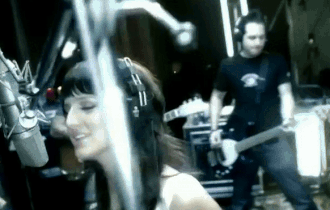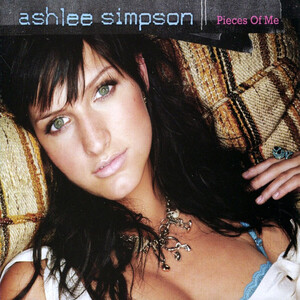Released: 27th September 2004
Writers: Ashlee Simpson / John Shanks / Kara DioGuardi
Peak position: #4
Chart run: 4-14-18-22-23-28-35-50-55-74
Billboard Hot 100 chart run: 61-53-29-28-23-23-16-13-9-8-8-5-6-7-11-13-16-19-24-37-48
Ashlee Simpson made a warmly received debut in America with Pieces Of Me. And, as the track started to enjoy international success, what could possibly go wrong…?

While her older sister, Jessica Simpson, pursued a pop career in the ‘90s, Ashlee Simpson initially went down the acting route (though not before appearing as a backing dancer in the music video for I Think I’m In Love With You). After a guest role in an episode of Malcolm In The Middle, she played Celia Smith in 7th Heaven for two seasons. However, during that time, Ashlee Simpson started dabbling in music, appearing on the soundtrack Freaky Friday in 2003. Shortly afterwards, it was announced that she’d signed with Geffen Records and would be recording her debut album, later titled Autobiography.

Following the success of MTV’s Newlyweds: Nick and Jessica, which turned Jessica Simpson into an early ‘00s pop culture phenomenon, the channel employed a similar strategy with Ashlee. The Ashlee Simpson Show aired back-to-back with Newlyweds and chronicled the creation of Autobiography, helping introduce her music to several million viewers, linking it to events in her life. Yet, despite the similarities in marketing through synergy (both sisters were managed by their father, Joe Simpson), a big part of Ashlee Simpson’s identity came from playing up the differences between her and Jessica. The pop-rock material she created was more current and aimed at a younger teen audience, while the show had a strong focus on showing her involvement in the creative process of writing and recording than Newlyweds did. Even the decision by Ashlee Simpson to dye her hair from blonde to jet black felt like a visual statement to emphasise the contrast between the siblings.

Centring The Ashlee Simpson Show around the development of Autobiography meant the album essentially became a product of the series and, thus, needed to be good enough to warrant such attention. However, Geffen were unimpressed with early demos and suggested Ashlee Simpson work with established songwriters to hone her sound. John Shanks ended up producing the album, and though he’d collaborated with many acts, his contribution to Michelle Branch’s The Spirit Room a few years earlier is a pretty good reference point for the sort of market Ashlee Simpson was aiming for. The artwork also consisted of hand-written song titles and scrawls similar to Avril Lavigne’s Let Go, further emphasising the confessional, autobiographical angle. In essence, the album pulled on established ‘00s pop-rock tropes without necessarily striving to do anything significantly new or different. However, it did them very well, evoking a sense of coherency and authenticity that connected with a sizeable fanbase.

As lead singles go, Pieces Of Me was a perfect way to launch Autobiography. Even critics who may have sneered at the prospect of Ashlee Simpson launching a pop career off the back of The Ashlee Simpson Show were hard-pressed to deny the track could conceivably have been a big hit without that additional promotion. It’s a toe-tapping mid-tempo where Ashlee Simpson’s preoccupied thoughts: “On a Monday, I am waiting, Tuesday, I am fading, and by Wednesday, I can’t sleep, then the phone rings, I hear you, and the darkness is a clear view, ‘cos you’ve come to rescue me” are composed in a way that is suitably angst-ridden, but not to the extent of being entirely teen-centric.

There’s a likeable honesty to Pieces Of Me that, to some extent, has the same appeal as Jessica Simpson’s With You in terms of showing the humble normality behind the celebrity facade. However, while With You was very much a song about Jessica Simpson, Pieces Of Me is pitched in a far more relatable way: “I am moody, messy, I get restless, and it’s senseless, how you never seem to care, when I’m angry, you listen, make me happy, it’s your mission, and you won’t stop ’til I’m there” to broaden its appeal.

The track also establishes Ashlee Simpson as a very different singer, not just from her sister but also from many other artists who released pop-rock material during the early ‘00s. There’s a faint rasp to the Texan drawl in her voice that fits the music well and is incredibly expressive. The rousing production on Pieces Of Me is radio-friendly. Still, it’s Ashlee Simpson’s charisma that really sells the track, particularly during moments like the middle eight: “How do you know everything I’m about to say? Am I that obvious? And if it’s written on my face, I hope it never goes away…yeah” where she’s able to perform more freely within the melody.

Central to the commercial appeal of Pieces Of Me, however, is the hazy chorus: “O-o-o-o-o-o-o-o-oh, it seems like I can finally rest my head on something real, I like the way that feels, o-o-o-o-o-o-o-o-oh, it’s as if you know me better than I ever knew myself, I love how you can tell, all the pieces, pieces, pieces of me, all the pieces, pieces, pieces of me”. It’s immensely catchy and delivered with a satisfying lilt; the whole thing comes off as effortlessly authentic, almost like Ashlee Simpson is reciting thoughts from her diary. Moreover, despite Pieces Of Me very much belonging to the ‘00s pop-rock era, there’s something charmingly timeless about the track; it wouldn’t sound wildly out of place on the radio now.

While Pieces Of Me is more than capable of standing alone from The Ashlee Simpson Show, the music video ties the two firmly together by mixing staged footage of Ashlee Simpson in a recording booth with a selection of clips from the series. In principle, capitalising on that synergy was inevitable. However, it also demonstrates how The Ashlee Simpson Show was not Newlyweds: Nick and Jessica in terms of pop culture impact. Avid viewers will likely recognise scenes from the show. But for the most part, they’re used to vaguely mirror the lyrics (like Ashlee Simpson walking up a hill and stumbling while the line: “Fall, sometimes I fall so fast” plays) and emphasise the focus on songwriting and music creation. The idea is simple enough and works for the song, though equally, there’s nothing about the behind-the-scenes elements of Pieces Of Me that look like the product of an eight-part series. In fact, after the finale, Ashlee Simpson was so eager to extricate herself from the arrangement that she declared the show wouldn’t return for a second season…

There’s no doubt Pieces Of Me benefited from the exposure that came with The Ashlee Simpson Show, yet the track was also a genuinely massive hit in its own right in America. Substantial airplay across adult and mainstream radio helped the song climb to a peak of #5 on the Billboard Hot 100. Furthermore, although downloads weren’t yet included in the chart, Pieces Of Me was, nonetheless, declared the top-selling digital song by a female artist in 2004, finishing ahead of Toxic by Britney Spears. That success intensified further with the release of Autobiography. The album sold 398,000 copies to debut at #1 and, after four weeks (three of them atop the chart), was already a million-seller. Even though a second single – Shadow – stalled at #57, the campaign overall was going well.

There was a bit of a delay in Pieces Of Me reaching the UK since the focus was – understandably – on maximising its impact in America. However, that did nothing to wane the track’s appeal. After being released in late September, Pieces Of Me entered the chart at #4, immediately achieving a higher peak than anything by Jessica Simpson at that point (though she’d match it the following year with These Boots Are Made For Walkin’). Pieces Of Me went on to be the 123rd biggest-selling single of 2004, with a total of 46,000 copies. Meanwhile, Autobiography debuted the following week at #31. Yes, that was modest by comparison to America, but it’s all relative and considering Jessica Simpson had only ever reached #36 with both Sweet Kisses and In This Skin despite having a higher profile, Ashlee Simpson’s early success was filled with potential.

By the time Pieces Of Me was released in the UK, preparations were underway for a third single from Autobiography in the US. Ashlee Simpson would sing the title track on Saturday Night Live, and there’s no way to discuss the album campaign without acknowledging what ultimately became the defining moment of it (and probably Ashlee Simpson’s entire pop career). After being introduced back to the stage, the beat of Pieces Of Me – which had already been performed earlier in the show – started to play along with the opening vocals of the song. A confused Ashlee Simpson looked around and, as her band tentatively started playing Pieces Of Me again, did an awkward jig before walking off-stage. At the end of the show, she explained to host Jude Law that her band had started playing the wrong song, and the only thing she could think to do was a hoedown.

The explanation given by Ashlee Simpson now is that nodules on her vocal cords meant she’d lost her voice (though, admittedly, that wasn’t apparent when preparations for SNL were documented on the second season of The Ashlee Simpson Show, which felt as if it had been commissioned, in some respects, as a means of damage control). However, rather than cancel the performance, she was instructed to mime instead, resulting in the wrong track being played. Sure, blaming her band on the night wasn’t a good look. But any artist would be thrown by what happened, let alone someone relatively inexperienced halfway through their debut album campaign. And what could Ashlee Simpson say in the 15 seconds before the credits rolled anyway?

From a UK (and elsewhere) perspective, it wasn’t unusual for acts to mime while accompanied by a band playing instruments that weren’t plugged in. Indeed, that’s precisely what Ashlee Simpson did when appearing on shows like CD:UK and Top Of The Pops. So, at worst, the SNL incident might be regarded as a faux pas. However, in America, while exceptions were made (albeit with a certain level of disdain) for performances that included energetic choreography, the expectation of an artist being on-stage with a band is that they would be singing live. Thus, even if it had been possible to cut into Autobiography after the initial mistake, the damage was already done. The fallout for Ashlee Simpson was nothing short of catastrophic. It didn’t necessarily end her career, as is sometimes claimed; she had a #1 album the following year and five further hits on the Billboard Hot 100. But everything after that was viewed, in one way or another, through the lens of SNL.

That put a lot of pressure on Ashlee Simpson. It’s not as if she couldn’t sing live because there are plenty of times she did while promoting Pieces Of Me. However, it’s entirely possible that, like many singers, she did so with a backing track on occasion. After SNL, though, that wasn’t an option. Everything had to be 100% live, and La La – which ended up replacing Autobiography as the next single – proved an unforgiving choice when there was so much scrutiny on Ashlee Simpson’s voice.

Pieces Of Me is, thus, pretty much the only single whose commercial success existed outside of the SNL palaver and demonstrated Autobiography‘s strengths. It’s a solid collection of songs marketed exceptionally well and possibly could have produced several further solid radio hits. Almost inevitably, though, the priority changed to drawing a line under the campaign as quickly as possible in an attempt to start anew. If only it had been that simple.



